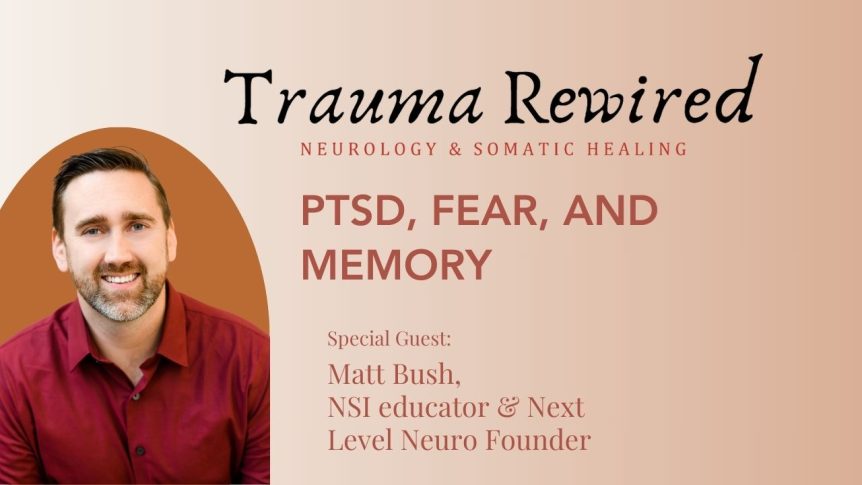
Have you ever wondered why some individuals bounce back from trauma while others develop PTSD? The answer might be tied to how our brains encode and process fear memories. According to recent research, resilience isn’t just psychological—it’s closely tied to the brain’s ability to adapt to stress and process trauma.
On today’s episode, Elisabeth and Jennifer are joined by Matt Bush, founder of Next Level Neuro and lead educator in the Neurosomatic Intelligence (NSI) course, who brings a wealth of knowledge on the latest research in PTSD and trauma healing. Together, we unravel the fascinating science of fear memory—how it begins as a broad, generalized response, and over time, becomes specific, tied to particular events.
But what happens when that process doesn’t work quite right? How does the brain get stuck in trauma? And what can we do about it? We take a close look at the key brain areas involved in emotional regulation, memory consolidation, and resilience, including the hippocampus, prefrontal cortex, and cerebellum.
Whether you’re a trauma survivor or a practitioner working with clients, this episode offers profound insights into how trauma is stored in the body and brain—and how you can support yourself or others in healing.
Matt, Elizabeth, and Jennifer break down complex neuroscience concepts into practical, actionable advice, all while emphasizing the importance of mind-body connection in trauma recovery. Healing is a journey, but with the right tools and knowledge, you can rewire your nervous system, integrate your memories, and build resilience in the face of adversity.
This episode is packed with practical, science-backed strategies to help you understand the neuroscience of trauma healing. You don’t want to miss this one!
Topics discussed in this episode:
What the latest research on PTSD has discovered
What is needed to change a broad fear based memory into a specific episodic memory
The hippocampus’ role in memory formation and PTSD outputs
The differences and similarities between PTSD and CPTS
Why EMDR works more effectively for PTSD vs. CPTS
Peak somatic experiences and their ability to tap into the broader memory store
Why embodiment is the key to combatting dissociation
How the cerebellum plays a role in regulating emotional and social outputs
Studies discussed in this conversation:
https://neurosciencenews.com/ptsd-fear-episodic-memory-27895/ https://neurosciencenews.com/cerebellum-social-cognition…/
https://neurosciencenews.com/child-trauma-thoughts-severity-27841/
Get started training your nervous system with our FREE 2-week offer on the Brain Based Membership site: https://www.rewiretrial.com
If you would like to WATCH the episode and/or have closed captions, check out our Trauma Rewired YOUTUBE channel!
If you need access to transcripts of this episode, you can find that HERE on Apple Podcasts.
Contact us about private Rewire Neuro-Somatic Coaching: https://brainbased-wellness.com/rewire-private-neuro-somatic-coaching/
Learn more about the Neuro-Somatic Intelligence Coaching program and sign up for the spring cohort now! https://www.neurosomaticintelligence.com
Connect with us on social media: @trauma.rewired
Join the Trauma Rewired Facebook Group! https://www.facebook.com/groups/761101225132846
FREE 1 Year Supply of Vitamin D + 5 Travel Packs from Athletic Greens when you use my exclusive offer: https://www.drinkag1.com/rewired